Harm Reduction International presents a number of awards at our international conference to acknowledge the contributions of outstanding groups or individuals in the fields of drug use, health and human rights.
You can read more about the different awards in the menu below.
We received a large number of nominations for incredible people and projects doing life-changing work in harm reduction. HRI extends its congrtulations to everyone who was nominated and to the winners especially. As Dan Winter said on twitter, the recipients "embody the amazing harm reduction work undertaken globally."
International Rolleston Award: All Ukrainian harm reduction NGOs and community organisations who worked in close cooperation and mutual support to mitigate the horror of war for people in their country.
Якщо ви належите до переможців Міжнародної премії Rolleston, будь ласка, завантажте свій сертифікат тут.
If you identify as being one of the winners of the International Rolleston award, please download your certificate here.
завантажити сертифікат/Download Certificate
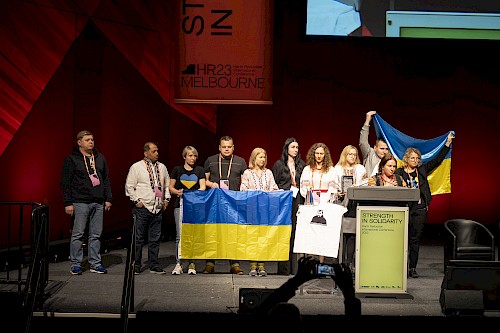
National Rolleston Award: Gaby Bruning who shows incredible passion and dedication in all of her work, but her drive and commitment to the harm reduction space in Australia is where her true passion lies and where she really shines.
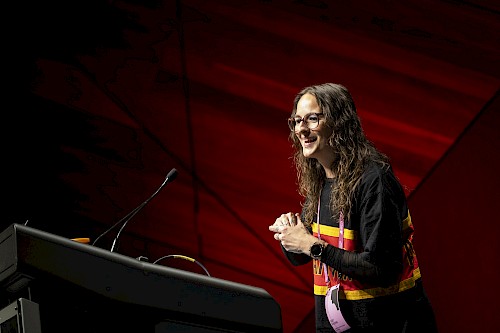
Carol and Travis Jenkins Award: Diane Lloyd who is a fierce advocate for her community; loudly and fearlessly sharing her experiences and working tirelessly for the rights of people living with HIV, specifically for people who inject drugs, as an advocate and mentor.
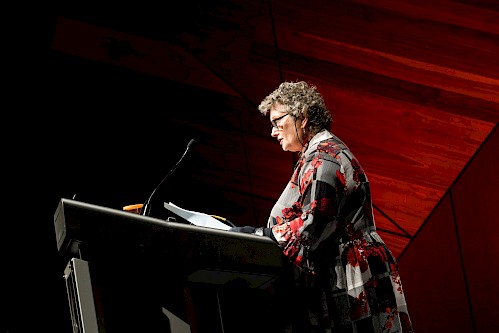
Gill Bradbury Award: The AIVL network of drug user organisations, which has had a significant impact on harm reduction in Australia. Currently these organisations are NUAA, QUIHN, QUIVAA, NTAHC, the SA CNP, PBHRWA, CAHMA and Harm Reduction Victoria.
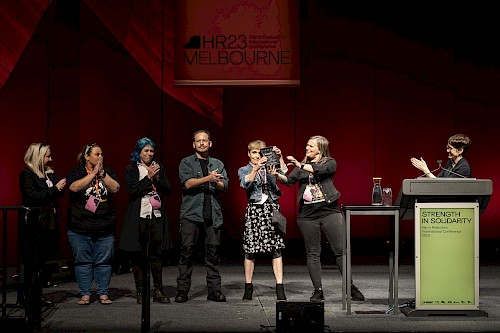
Brooklyn McNeil Rae of Hope Award: Tam Nguyen Thi Minh and Diep Nguyen for their paper Results after 6-month pilot implementation of the methadone take-home program in Vietnam.
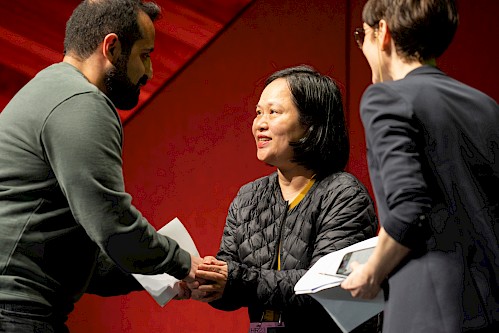
This award was first presented at the ‘3rd International Conference on the Reduction of Drug Related Harm’ in Melbourne in 1992 and is given to an individual, group or organisation that has made an outstanding contribution to harm reduction at an international level.
The award aims to recognise work in any of the following areas:
There is no cash prize for this award; the winner is presented with a trophy and has their name listed on the HRI website.
Nomination criteria
Nominations are for individuals, groups or organisations working at the community level, national and/or international levels.
The following criteria, with a focus on ‘international significance,’ are considered and assessed in reviewing the nominees:
Background
The award is named after Sir Humphry Rolleston, President of the Royal College of Physicians who chaired the UK Departmental Committee on Morphine and Heroin Addiction. In 1926 the committee concluded that the prescription of heroin or morphine could be regarded as legitimate medical treatment for those who required it – a decision that epitomises a benign, pragmatic and humane approach to drug problems, and was a landmark event in the history of harm reduction.
Previous Winners
The National Rolleston Award is given to an individual, group or organisation that has made an outstanding contribution to harm reduction in the conference host country. For HR23, all nominations for this award came from Australia.
The award aims to recognise work in any of the following areas:
There is no cash prize for this award; the winner is presented with a trophy and has their name listed on the HRI website.
Nomination criteria
Nominations are for individuals, groups or organisations working at the community level, national and/or international levels.
The following criteria, with a focus on ‘national significance,’ are considered and assessed in reviewing the nominees:
Background
The award is named after Sir Humphry Rolleston, President of the Royal College of Physicians who chaired the UK Departmental Committee on Morphine and Heroin Addiction. In 1926 the committee concluded that the prescription of heroin or morphine could be regarded as legitimate medical treatment for those who required it – a decision that epitomises a benign, pragmatic and humane approach to drug problems, and was a landmark event in the history of harm reduction.
Previous Winners
This award has been presented each year since 2005 to a person who either used to, or currently uses drugs, and who has made an outstanding contribution to reducing drug-related harm.
There is no cash prize for this award; the winner receives a scholarship to attend HR23, is presented with a trophy and has their name listed on the HRI website.
Nomination criteria
Nominations are for individuals, groups or organisations working at the community level, national and/or international levels.
The following criteria are considered and assessed in reviewing the nominees:
Background
The award was initially named after Travis Jenkins, an extraordinary jazz musician and composer who died of cancer in 2004. In 2009, the award was renamed to include the name of Travis’s wife, Carol, who worked for many years with the Papua New Guinea Institute of Medical Research as a medical anthropologist, and was one of the leading instigators to setting up the National Aids Council. Carol Jenkins was renowned for her research into sexual behaviour and was a leading expert on HIV/AIDS. Equally important was her connection with the Hagahai people of Papua New Guinea, who were her second family.
Previous Winners
The Centre on Drug Policy Evaluation (CDPE - formerly the International Centre for Science in Drug Policy) launched the Brooklyn McNeil Rae of Hope Award at HR17 in Montreal, to honour the best scientific abstract in the area of harm reduction or drug policy. The aim of the award is to encourage high-quality scientific research to support evidence-based advocacy efforts in drug policy reform. The winner receives a waiver to publish in the peer-reviewed open-access Harm Reduction Journal, as well as AUD $830.
The award is named after Brooklyn Rae McNeil, a vocal advocate for safer injection sites and a vital support in the lives of many people who use drugs in Toronto, Canada. As a harm reduction activist whose life was cut too short as a result of an opioid overdose, Brooklyn’s spirit serves as an unwavering reminder of the need to conduct research and evidence-based advocacy to prevent the senseless loss of lives that could be avoided with drug policies grounded in evidence and human rights.
Previous Winners
New for 2023, this award is named for Gill Bradbury, who passed away in 2020. Gill was our inimitable Conference Medical Coordinator.
A force of nature, Gill was brilliant to work with. Gill went above and beyond to care for our delegates. Despite always being on duty, Gill was the life and soul of the after hours party. Gill is irreplaceable at our conference and in our hearts.
The Gill Bradbury Award is awarded to an individual, group or organisation providing excellent services to people who use drugs. The inaugural award, which was presented in 2023, had a special focus on superlative service provision during the COVID-19 pandemic.
There is no cash prize for this award; the winner will be presented with a trophy and will have their name listed on the HRI website. The top scoring nominees will be listed in the HR23 programme and website.
Nominations are invited for individuals, groups or organisations working at the community level, national and/or international levels.